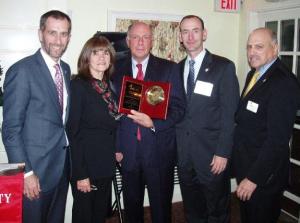
With Rosalie Marano, Judge Anthony Marano, Nassau Chapter President Tom Foley ’93, and Alumni Association President Alan Hodish ’89
Earlier this month, the Nassau Chapter of our Alumni Association honored New York State Supreme Court Judge Anthony Marano, the Administrative Judge of Nassau County. The reception at the Milleridge Inn was a lovely celebration of Judge Marano’s dedicated career as a public servant and his loyal support of St. John’s.Earlier that same day, Judge Marano had asked me to speak as part of “Juror Appreciation Day” at Nassau County Supreme Court. I welcomed the opportunity to reflect a bit on what jury service means to me. Here is what I told the several hundred assembled jurors:
I’ve been a lawyer for 23 years, I’ve been a law professor for 14 years, and I’ve been a law dean for the past four years. But I’m here today not as a lawyer, or a law professor, or a dean, but as a citizen and a resident of Nassau County.
In a democracy, there are two main ways in which we get to participate in our government – by voting on election day and by serving as jurors.
I hope you all voted last week. I did, and I get a special thrill whenever I do. As Bob Scheiffer said during one of the Presidental debates: “Voting makes you feel big and strong.” When I vote, I feel the power of self-government.
But that power – the power of the vote – is indirect. When I vote, my vote is only one of thousands or millions. And it’s natural to wonder whether my one vote really makes a difference. Moreover, when we vote, we’re not making the decisions about how to run our country or our county or our town. We are electing other people to make those decisions for us. That’s how representational democracy works – the people have the power, but that power is indirect. It is our elected officials who make the law, who make the decisions for us.
But when we are jurors, it is very different. When we go into the jury box, there are not millions or thousands of votes. There are six or eight or twelve. So there’s no question that our vote counts. And, we’re not electing someone else to make the decision. We are doing it ourselves. Being on a jury is participatory democracy at its best. The judges will run the trial, the lawyers will present the evidence and make their arguments, the judges will instruct us on the law, but the jury will render the verdicts. Individual citizens – not judges, not government officials, not lawyers – are given the power to decide disputes. It is an awesome power, a tremendous responsibility, and a wonderful aspect of our democracy.
There is a reason that our legal system gives that power to juries. And I tell this to my students all the time: because juries are good at it. It can be easy to be cynical these days, including about government, but the jury system really does work. There’s something about bringing a group of people together – people with different experiences and different perspectives – and having them listen: listen to the evidence, listen to the lawyers make their arguments, listen to the judge give instructions, and then listen to each other – that leads to good decisions, to fair decisions. That leads … to justice. That is what you get to do today, that is what you get to do as jurors: render justice.

Leave a comment